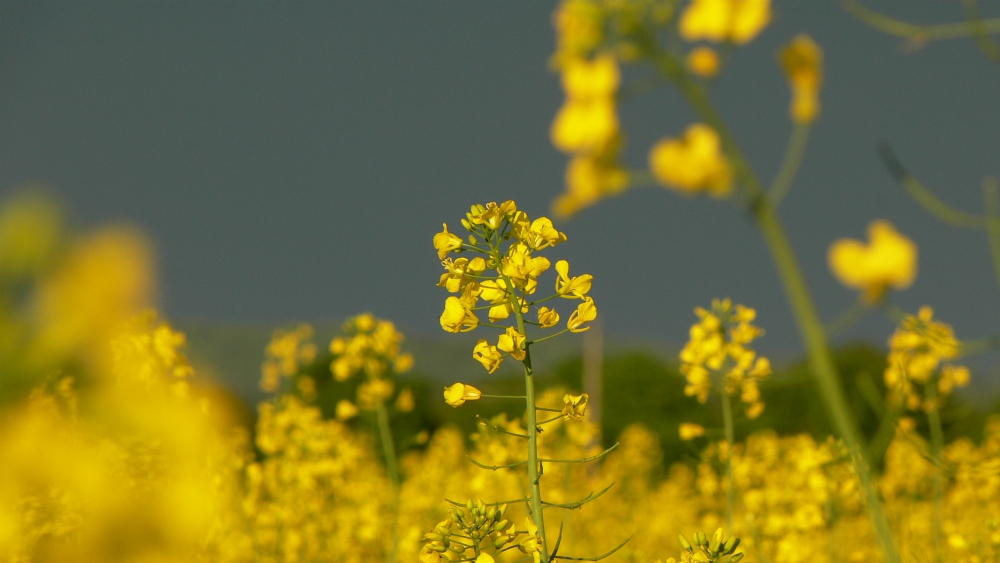
(Wikimedia Commonsl/Petr Pakandl)
When a child makes a wish while blowing the fluff of a dandelion gone to seed, whatever her dreams may be, her father is secretly hoping that the seeds don't take root in his lawn. Those miniature seeds, like little children, are amazing bundles of vitality just waiting to flourish. Their tenacious sprouts are a living exhibition of creation's urgency for growth.
When he was a kid, Jesus must have enjoyed watching the proliferation of the wild mustard plants that invaded his neighbors' fields. No more cherished than dandelions or kudzu, they're notable because they grow like crazy, respecting no boundaries, surviving weather's adverse attacks, and impudently making their presence known where farmers want to see only well-cultivated, purposeful plants. That's Jesus' image for faith.
Today's Gospel gives us a curious combination of images. Although it sounds so obvious that it should go without saying, as we listen to these sayings we should make ourselves keenly aware that Jesus came up with examples like this because he really believed in the message he was preaching. He was absolutely convinced that the power of God's love was like a seed that, given the right conditions, would change the world.
But he also knew that it doesn't happen overnight. This may be the point of apparent non sequitur in today's Gospel in which, after talking about the seed, Jesus suggests that when tired field hands get home, they should clean up and start to wait on tables.
In other parables, Jesus promised that he would receive his missionaries like a master who puts on an apron and serves them. At the Last Supper, he went to the extreme of performing a living parable about God's infinite self-giving by taking the role of a slave and washing his disciples' feet.
Now, he looks at his impatient disciples and says, "When you finish plowing or shepherding, don't think your work is done. In fact, all those activities were just the prelude."
Advertisement
Before we protest that Rerum Novarum and the Catholic social teaching that followed it calls for decent working conditions, we should pay careful attention to the examples Jesus chose. He was talking to servants who had been plowing (as in sowing the word) or caring for the sheep (as pastors). Their arrival home was the time not to end their work, but to bring it as an offering to the table.
In effect, Jesus was saying, "Once you have evangelized in word and deed, it's time to bring it all to completion at the table of communion."
After all, isn't that what he did? He spent years healing and teaching and when he knew the end was near, he celebrated a final meal that symbolized everything that had already happened and was about to be fulfilled.
Reading today's Gospel in this way illuminates Jesus' theology of ministry and sacrament. Moments of service in the field lead us to the table and vice versa. Christians at the table — whether at the altar, at the lectern or in the pews — are never there to be served, but to serve.
Our participation at the table, our Eucharist, is a summary and a launching pad. (Vatican II used more sophisticated language, calling it the source and summit of our Christian life.) Here, we symbolically celebrate and are nourished for all that we are called to do in our daily discipleship.
In the Northern Hemisphere, we are now about two weeks into the season of autumn, the time of harvest. It's a time of winding down; hints of winter tempt all living things to claim some hibernating time. This week's readings counter any tendency we might have to put away the plow and apron.
Our selection from Habakkuk reminds us that the evil and chaos that seem to be winning the day are merely temporary. Although violence and ruin seem to win the day, the vision of God's reign that we have inherited will come to fruition. Like evolution with its fits and starts, "the vision still has its time, presses on to fulfillment and will not disappoint."
Thus, singing Psalm 95, we remind ourselves to keep our hearts ready to hear God's voice.
All of that is summed up in Paul's call to Timothy to "stir into flame the gift God gave you." Remember the days when the vision of faith set your heart on fire and understand that glowing embers are all we need to set the world afire.
In today's opening prayer, we ask the God whose gifts never fail to stir up our faith so that its power becomes visible in our lives. In these autumn days, let us remember that God's grace is like the mustard seed — yearning to sprout anew in us and our world.
Jesus believed it — so can we.
[Mary M. McGlone is a Sister of St. Joseph currently writing the history of the Sisters of St. Joseph in the U.S.]
Editor's note: Sign up to receive weekly Scripture for Life emails.








